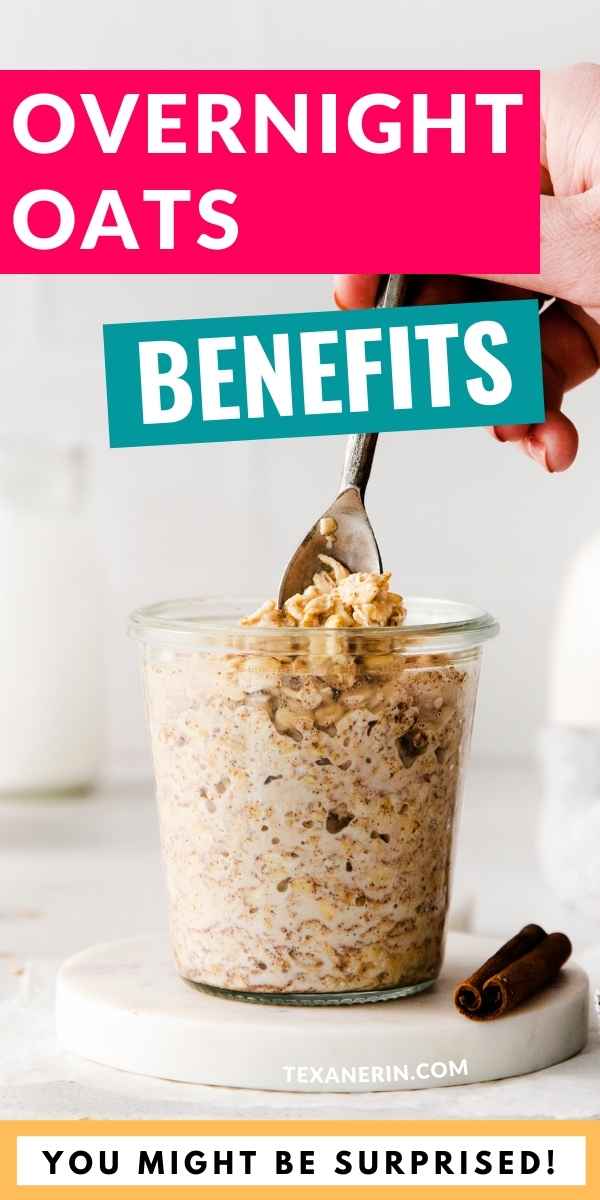Wondering if overnight oats are healthy? They are indeed! And you might be surprised to hear about the extra benefits of eating cold overnight oats.
In addition to all the other goodness that comes just from consuming oats, overnight oats are prepared and served cold which aids in digestion. Soaking breaks down starches which makes them easy to digest and gives you more nutrients than a heated bowl of oatmeal.
Also, if you’re cooking a quick oatmeal breakfast using instant oats, then you’re likely using a heavily-processed product that most probably contains artificial flavors and preservatives.
So if you’re wanting to keep it healthy, making homemade oatmeal with rolled or steel-cut oats will give you a nutritional boost that is not as processed.
Raw vs. cooked oats
Overnight oats are raw* and offer a range of health benefits. The oats maintain their vitamins and minerals – including manganese, phosphorus, magnesium, copper, iron and zinc – throughout the soaking process.
Because they’re left to soak overnight, that means their nutritional value is retained, unlike in cooked oatmeal.
* I should say “more raw” rather than just “raw”. That’s because most types of processed oats have been pre-steamed and heated in order to destroy potentially harmful pathogens. They do that to make the oats safe to eat raw (as in, not cooked).
Digestive benefits
The starch and phytic acid naturally found in oats are broken down when you soak them. This makes overnight oats more digestible than regular cooked oatmeal.
Oats, in general, also help in clearing out your digestive tract, thanks to their high fiber content.
Resistant starch
Oats are also high in resistant starch, which are carbohydrates that don’t break down into sugar and that aren’t absorbed by the small intestine. That resistant starch helps support a healthy gut.
This is why – most of the starch that we eat is quickly digested in the small intestine, with only a fraction surviving and passing through to the large intestine (the colon).
The starch that escapes the small intestine and moves on to the large intestine acts as a source of food for the good bacteria in the large intestine. That helps fuel their growth and also promotes positive changes in the gut, including protecting against certain diseases.
Phytic acid
Soaking oats decreases phytic acid better than if you just cook them. Phytic acid can prevent your body from absorbing key nutrients, so the less phytic acid, the better you’ll be able to digest the oats.
Some websites say that overnight oats are great because the oats are soaked and that reduces the phytic acid. But they seem to be missing the fact that you’re still consuming the phytic acid since you’re not rinsing it off after the oats have soaked.
Luckily, there’s a way around this. Kind of.
Since you’re not going to rinse the oats, and thereby rinse away the phytic acid, you’re not going to get rid of it. But you can neutralize it!
To do this, add a splash of fresh lemon juice. You can also use apple cider vinegar, but I prefer lemon juice because you can’t really taste it, and it doesn’t alter the taste of the oats.
You can taste the apple cider vinegar a bit, so if you dislike the taste (like I do), then definitely go with lemon juice.
Both lemon juice and apple cider vinegar aid in digestion and mineral absorption, so that’s another bonus. You’re not using a lot, but still – pretty cool!
But note that although many recipes say the oats will be ready in as little as four hours, you need to let the oats soak for at least 12 hours if you’re wanting to neutralize the phytic acid.
It’s also recommended (and some say necessary), to use warm liquid to soak the oats. Then you let them sit at 4 hours at room temperature, or even somewhere a little warmer than room temperature, before moving into the refrigerator for an additional 8+ hours.
I’m too lazy to heat up the milk, so I use cold milk. I put the bowl with the prepared oats on a cooling rack and put that over a burner that’s still warm after making dinner. It warms everything up nicely, my bowl isn’t at risk of breaking, and takes no time as I have the cooling rack right there.
To properly ferment, they need more time at room temperature. But you also risk them spoiling if you leave at room temperature longer than 4 hours.
So this is a good compromise. Four hours is enough to allow some beneficial microorganisms to grow, but not so long that you’re risking anything.

Overnight oats for weight loss
This is a benefit of oats in general, but a great one. When you eat oats, they keep you feeling fuller for longer. Which means you won’t be stuffing your face with cookies mid-morning for some quick energy.
This is due to their high fiber content, and in particular, beta-glucan. Beta-glucan is a type of soluble fiber that’s naturally found in food, with the highest concentration in oats and barley. It can also be found in other grains, mushrooms, and seaweed.
In addition to keeping you feeling full, beta-glucan can also increase levels of an appetite-suppressing hormone that also helps with appetite control.
A lot of the benefits listed below are also thanks to the presence of beta-glucan.
Benefits of oats in general
- Nutrient dense – especially compared to a lot of other grains. They’re high in vitamins and minerals such as folate, phosphorus, magnesium, manganese, iron, and zinc.
- Can help improve immune system – beta-glucan stimulates white blood cells, which are the infection-fighting blood cells, and helps them fight off infections. Also, oats contain zinc and selenium, which are two important nutrients for fighting off infection.
- Can help improve blood sugar – part of this is due to the high fiber content. A high-fiber diet helps improve insulin sensitivity and can reduce postprandial glucose levels. Studies also show that the consumption of beta-glucans helps decrease glucose levels of diabetic patients.
- Promote healthy gut bacteria – oats are a prebiotic, meaning that they feed the good bacteria in your gut. So you can think of them kind of like a booster for probiotics!
- Rich in antioxidants – and notably, avenanthramides, which is a group of antioxidants found exclusively in oats. Avenanthramides can help lower blood pressure and has anti-itching and anti-inflammatory effects.
- Can help lower cholesterol levels – studies show that oats can lower LDL cholesterol, which is the “bad” type.
- Can help decease heart disease risk – due to lower LDL cholesterol levels mentioned above.
- Can help lower chance of colon cancer – thanks to the high fiber.
And that’s not all. There are so many benefits of oats and preparing them properly is an important step of getting the most from them.
Want to learn more about overnight oats? I’ve got you covered!
I just posted these PB2 Overnight Oats and have several more recipes coming up!


